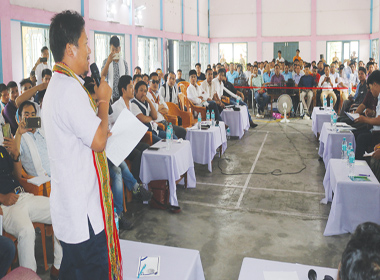DIYUN, Jun 17: The All Arunachal Pradesh Students’ Union (AAPSU) has said neither it nor the indigenous people of the state would accept granting of citizenship rights to Chakma and Hajong refugees in the state.
AAPSU president Hawa Bagang made the union’s stand clear during a meeting with representatives of the two refugee groups at the community hall here in Changlang district on Sunday.
Bagang said the movement against refugees is to protect the indigenous people of the state.
“It is a question of the survival of the people. The indigenous people of Arunachal Pradesh and the AAPSU will never accept citizenship rights to Chakma and Hajong in the state,” he said.
Bagang asked the Chakma and Hajong refugees to cease all criminal activities and atrocities against the indigenous people.
He said the AAPSU will advise the state government to provide all basic facilities to Chakmas and Hajongs as refugees in a designated area, “but they should not demand citizenship rights.”
The Chakma and Hajong representatives should clearly identify the immigrants who were brought in by the government of India and all the illegal immigrants, he said.
“All illegal immigrants should leave the state,” he said.
AAPSU general secretary Tobom Dai presented a review of the history of Chakma and Hajong refugees and said they should not demand the rights of the indigenous people of the state.
“The government of India is granting citizenship rights to Chakmas and Hajongs in other states of the country, and it is a golden opportunity for the refugees to get citizenship rights; but they have to leave Arunachal. Or else the Chakmas and Hajongs should live here after regulated identification of the immigrants who were brought during 1964-69 to the designated area as refugees.”
CCRCHAP general secretary Santosh Chakma said the refugees want to live as citizens of the country, and agreed to cooperate in identifying the refugees who were brought during 1964-69 from the illegal immigrants, the AAPSU stated in a press release.
The AAPSU delegation was on a five-day tour to the ‘Chakma and Hajong affected’ areas to take stock of the ground realities and to seek the opinions of the indigenous people as well as the refugees.
During the visit, the AAPSU conducted a series of meetings at Namsai and Diyun.
The AAPSU, its federal units, and various community-based organizations in a joint meeting held at the conference hall in Namsai on 16 June suggested to the government to stop the continuing unauthorized infiltration of Chakmas and Hajongs into the state “and distinguish between legal immigrants who were brought in 1964 and other illegal immigrants.”
They asked the government to appoint monitoring officers to look into the activities of Chakma and Hajong refugees; initiate steps for maintaining a register of all Chakma and Hajong families; and issue proper identification cards to the refugees.
They also said the Chakmas and Hajongs should be clearly identified as refugees.
The organisations observed that fresh infiltration by Chakmas and Hajongs is the main cause of the disturbances in the districts, and that the Chakma-Hajong population in the state is increasing rapidly due to infiltration on a daily basis.
Despite being allotted designated camps, the Chakmas and Hajongs are encroaching on forest and private land, they said. “They are also found levying tax on the indigenous people and creating commotion in the localities,” the organisations observed.
The members present in the meeting further said that the state government has consistently failed to address the grievances and demands of the indigenous people for many years.
“The acceptance of SLP in the Supreme Court makes the regulations which protect the indigenous people more effective. The central government should give fresh directives to the state government for effective implementation of all the regulations,” the participants suggested.
Stating that the movement against Chakmas and Hajongs is a matter of the survival of the indigenous people of the state, the organisations lamented that the movement lacks knowledge, unity and finance.
The meeting on 12 June was attended by representatives of the Tai Khampti Singpho Council, the Tai Khampti Development Society, JACHIN, the Singpho Development Society, the Singpho Youth Organisation, and the Mother Association Miao, along with those of the federal units of the AAPSU from Namsai, Changlang, Tirap, Longding, Lohit, and Lower Dibang Valley districts, and community-based student organizations such as the All Bordumsa Students’ Union, the All Mishmi Students’ Union, and the All Tai Khampti Singpho Students’ Union.



